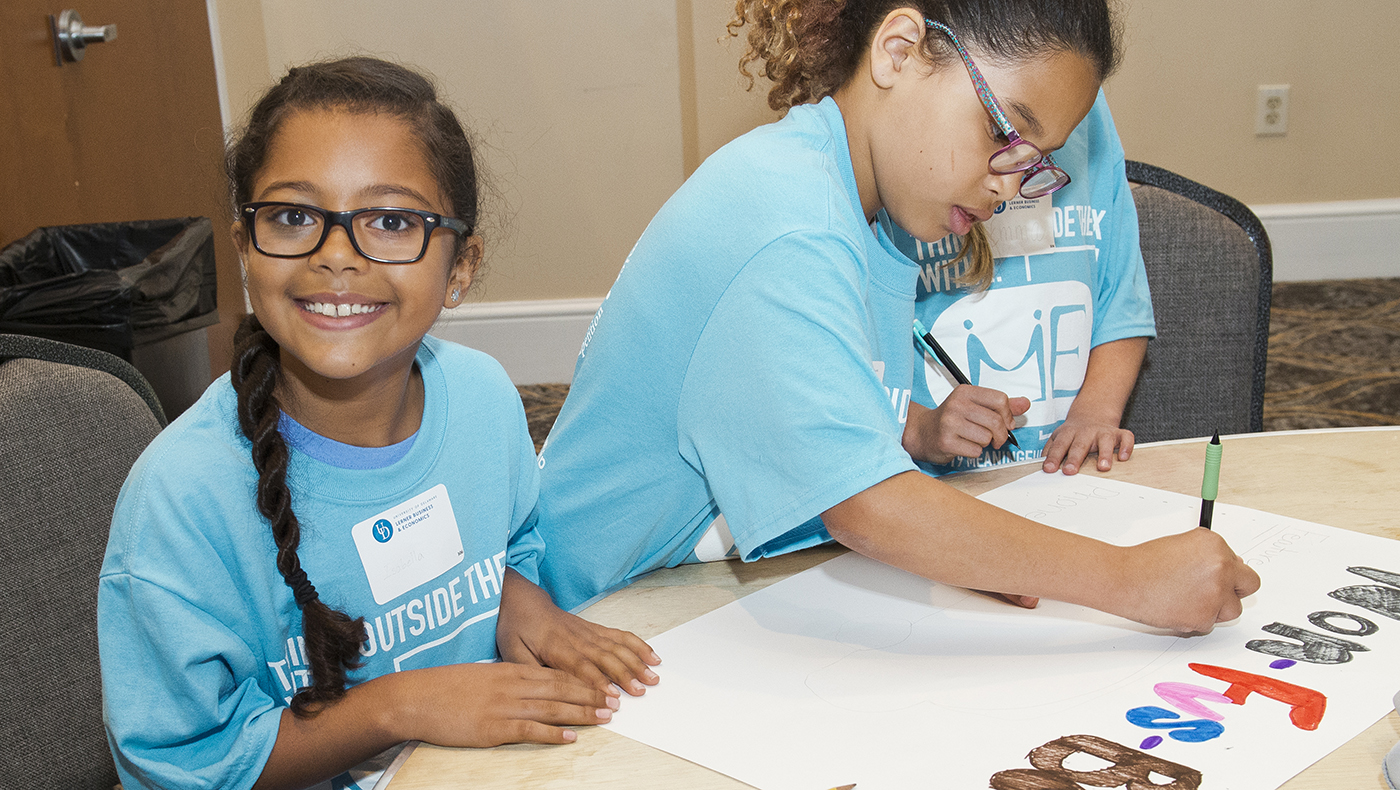Brian Tagoe, fourth grade student at Brader Elementary School, walked through the doors at the 32nd annual Meaningful Economics (ME) Competition with a big smile on his face. Tagoe and his four teammates joined more than 600 third through fifth grade students from 26 elementary schools across Delaware participating in the ME Competition.
Tagoe’s team was greeted by a volunteer from the University of Delaware’s Center for Economic Education and Entrepreneurship (CEEE) who handed them T-shirts designed by a former participant and who told them that, “Your smile is your ticket into the competition. It’s going to be a fun day!”
“[I’m excited about] pretty much everything,” Tagoe said. “Working together with my friends… and [I’m excited about] having fun because not everything’s about winning. The best part of competition is having fun. It would be nice to go home with a few medals, but it’s not the priority.”
The ME Competition gives students the chance to be recognized for their economic, personal finance and entrepreneurship prowess through three levels of competition. Students compete in three events at their grade level including a production activity, a written test and an entrepreneurial problem-solving activity. Prize ribbons are then awarded to first through fourth place winners in each grade and in each category of competition.
“I’m most excited for the first round,” said Brady Shelton, fourth grade student at Maclary Elementary School and returning ME Competition participant. “Last year, our team didn’t get a ribbon, but we wanted to. We worked really well together so I’m excited for that part [of the competition].”
The first round of competition is a production activity where teams must follow directions to produce standard items. This activity encourages students to plan, specialize and manage the provided resources including time and human capital. Teams are judged for the accuracy, quality and quantity of the products they complete in this round.
“We practiced a lot and took our time answering questions on the test, and we just did our best,” said Emma Leslie, fourth grade student at MOT Charter School, describing how her team prepared for the second round of competition, the written test. This test evaluates students’ economic and personal finance knowledge.
“If I had to choose, I’d have to say my favorite part last year was the problem [-solving activity] because you get to use your imagination,” said Zachary Benson, fourth grade student at Odyssey Charter School, also a returning ME Competition participant. “For me, this competition was really fun. I like the round where they say a problem and you draw and come up with a product and a price.”
In this final round of competition, students tackle an entrepreneurial problem-solving activity. Teams must design a new product or service that addresses the standard need presented in the problem. As a team, the students then pitch their ideas to a panel of judges, made up primarily of representatives from the Delaware banking community.
“It’s really important for them [the students] to learn about real-life things like economics and I think it just enhances the curriculum so they get more benefit than they would in a normal school day,” said Trish Irons, fifth grader teacher at MOT Charter School. “The competitive environment and the chance to work in teams, it’s really good for them and they love it.”
The Delaware ME Competition is made possible through the support of the Delaware Council on Economic Education, Bank of America and Discover Bank. The competition is held at two different locations, with each of the three Newark events being hosted for a separate grade. Judges for the competition include representatives from these donor organizations, as well as volunteers from Barclays Bank Delaware, Fulton Bank, Wells Fargo, Adopt-a-Family, Sussex County Community Development & Housing and UD’s Alfred Lerner College of Business and Economics. Also assisting every year is State Bank Commissioner Robert Glen.
“This is a major volunteer effort both for me personally and for the whole Adopt-a-Family team,” said Lisa Johnson, program administrator for Delaware Adopt-a-Family and ME volunteer for the past four years. “You never know what they might want to do when they get older; some kids might want to start their own business. I hope students gain practical experience in entrepreneurship. In just three hours, they learn how to build a product basically from the ground up. They learn how to market the product and what goes into it, so I really like that.”
At the end of four days of competition, ME volunteers had distributed nearly 400 prize ribbons to excited elementary school students like Tagoe. Some students, having placed among the top four scoring teams in all rounds of competition, left with three ribbons each. But for Tagoe’s teacher, Margaret McNutt, that’s not what the ME Competition is really about.
“In class we teach math involving probability and statistics, and we teach math problem solving,” McNutt remarked. “They [students] are encouraged to use that information to come up with creative new ideas to serve their communities. We’ve always loved coming here because students learn a lot. It’s nice that they can participate in third, fourth and fifth grades. Returning students can then take that knowledge with them and it grows over time.”




